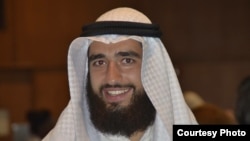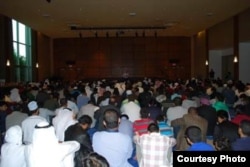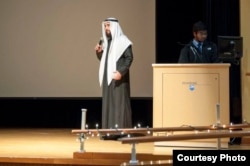According to a recent estimate, there are 3.3 million Muslims living in the United States, making up about 1 percent of the U.S. population. About 150,000 are of Syrian ancestry. Thousands are college graduates trained in medical, technical, engineering and business specialties, with incomes above the national average.
Education is extremely important to Muslim Americans. And higher education includes fraternity life.
In an effort to enhance their American identity, 15 Syrian-American students at Pennsylvania State University, one of America’s largest public universities, have formed a chapter of a growing national Muslim fraternity, Alpha Lambda Mu.
“The idea is to create a place where Muslim students can go on campus and essentially feel that they can experience college to the full potential, but in a way that aligns with Muslim values and interests,” Zico Khayat, a third-year science student at Penn State, told VOA.
Khayat said Islamic State's attacks in Paris and other terrorist threats, plus verbal assaults against Muslims in the current U.S. political campaign, also are reasons for Syrian-Americans to participate fully in campus life.
Penn State is located in the small town of State College, in the eastern United States. The university population is approximately 45,000, with a blend of religions, ethnicities and colors. Approximately 1 percent of the student body is Muslim, including Syrian-Americans.
The university administration recently invited Muslim students to a breakfast, a step that Khayat called “real care and initiative” on the part of the university.
“They really wanted to hear from us and talk to us. People are learning we are good people,” he said.
Muslim students “purchased over 75 cases and 100 single gallon jugs of water that they donated to people in Flint, Michigan, on February 1st,” Khayat noted proudly. "We do things on campus to show that we are normal people; you shouldn’t be scared of us.”
Natives of town
Both Khayat and his brother, Zak, were born and brought up in State College. Zak Khayat has a bachelor's degree in material sciences and engineering. Before enrolling in graduate school, he was a resident assistant on campus for three years.
“Before the whole Syria crisis, when I would say my family is from Syria, people never heard of the country before," Zak Khayat told VOA. "I have never felt out of place. People at Penn State are open and so accepting of other faiths. It allowed me to get closer to my religion because I had a place to go and study at the same time. People now recognize my religion.”
Commenting on the idea of a national registry or ID program for Muslims of the kind proposed by Republican presidential candidate Donald Trump, Zak Khayat said: “Why do we need to carry ID cards if others don’t carry ID cards? What’s special about us that you make us carry ID cards?”
Robert Smith, director of the Center for Spiritual and Ethical Development at Penn State, said 60 different religious groups utilize his facility. He said the Syrian-American students feel supported and very welcome, adding: “Most people are open and just willing to look at them as individuals, not as a group or anything like that. That seems to work pretty well for them.“
Nada El-Hillal, who will be graduating from Penn State in three months, is majoring in bio-behavioral health, which is a combination of biology, psychology and sociology. El-Hillal was born in Dubai. Her parents are from Syria.
She said she has not faced much discrimination, and called Trump and his views “absurd."
"Doesn’t make sense to me,” she said of Trump. “He says, 'Go home.' And this is my home, you know? It’s just kind of sad that people have the wrong idea about Islam. I don’t know how people see me, but this my home. America is my home, and I’m just going to school like everyone else.”


